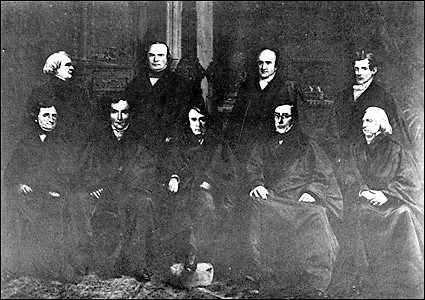Dred Scott v Sandford: The Relevant Constitutional Text with Notes

The Taney Court that decided the Dred Scott case
Article I, Section. 9.
The Migration or Importation of such Persons as any of the States now existing shall think proper to admit, shall not be prohibited by the Congress prior to the Year one thousand eight hundred and eight, but a Tax or duty may be imposed on such Importation, not exceeding ten dollars for each Person. [Note: This provision protected the slave trade in the southern states until 1808, but Taney somehow found it to have continuing relevance to the question of the power of Congress to regulate slavery in 1857.]
Article III., Section. 2.
The judicial Power [of the United States] shall extend to all Cases, in Law and Equity, arising under this Constitution, the Laws of the United States, and Treaties made, or which shall be made, under their Authority; . . .to Controversies . . .between Citizens of different States. . . . [Note: This is the constitutional basis for Scott’s suit against Sanford in federal court. Scott was a presumed citizen of Missouri and Sanford a citizen of New York. Generally, for purposes of this provision residence and capacity to own property was sufficient to establish citizenship. After all, if one was not a “citizen” for purposes of this provision, not only could he or she not sue—it would also be true that he or she could not be sued. Taney did not allow for the possibility that the word “citizen” under this provision could be given a more generous meaning than under the Privileges and Immunities Clause.]
Article. IV. ,Section. 1.
Full Faith and Credit shall be given in each State to the public Acts, Records, and judicial Proceedings of every other State. And the Congress may by general Laws prescribe the Manner in which such Acts, Records and Proceedings shall be proved, and the Effect thereof. [Note: If Scott had gotten a declaration from a court in Illinois or the Wisconsin Territory declaring him to be a free person, he might have argued his freedom was guaranteed under the Full Faith and Credit Clause.]
Article IV, Section. 2.
The Citizens of each State shall be entitled to all Privileges and Immunities of Citizens in the several States. [Note: Under the Articles of Confederation, the “free inhabitants” of each state were entitled to the privileges and immunities of “free citizens” of other states. At the Constitutional Convention of 1787, the change in wordage was approved without objection. If the change were really meant to have altered the meaning of “free inhabitants,” a contentious debate could have been expected—but none occurred. Taney also essentially rewrote this provision to read: “The citizens of each state who are also citizens of the United States are entitled to all the Privileges and Immunities in the several states.” Taney deemed state laws that conferred citizenship on Negroes irrelevant.]
…
No Person held to Service or Labour in one State, under the Laws thereof, escaping into another, shall, in Consequence of any Law or Regulation therein, be discharged from such Service or Labour, but shall be delivered up on Claim of the Party to whom such Service or Labour may be due. [Note: Taney found the Fugitive Slave Clause, though focused on a narrow and specific situation, to support his conclusion that the Constitution denied to Congress the power to prohibit slavery in the territories.]
Article IV, Section. 3.
The Congress shall have Power to dispose of and make all needful Rules and Regulations respecting the Territory or other Property belonging to the United States….[Note: Taney gave this power a very narrow reading, but James Madison stated the power allowed Congress to “institute temporary governments.”]
Amendment V
No person shall be held to answer for a capital, or otherwise infamous crime, unless on a presentment or indictment of a Grand Jury, except in cases arising in the land or naval forces, or in the Militia, when in actual service in time of War or public danger; nor shall any person be subject for the same offence to be twice put in jeopardy of life or limb; nor shall be compelled in any criminal case to be a witness against himself, nor be deprived of life, liberty, or property, without due process of law; nor shall private property be taken for public use, without just compensation. [Note: Taney argued the Fifth Amendment should be read as a general prohibition on the taking of property, which he concluded Scott was. Thus, he suggested, it would be a violation of the Fifth Amendment for a slave owner to lose his property simply by virtue of bringing his slave into a free state or territory.]
